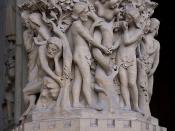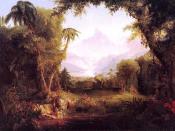The biblical text and Koranic Surans derive its narrative of the Garden of Eden and creation of humanity from a similar basis. However, interpretations of each account vary greatly within the Islamic text of the Koran and the Christian text of The Old Testament. Although both the biblical text and Koran Surans texts are derived from the Adam and Eve narrative, many differences can be distinguished on how each text approaches the Creation narration. The incident that occurs in the Garden of Eden has significant implications in understanding the reason why Adam was placed onto Earth.
According to the account recorded in Genesis, Adam and Eve, upon being influenced by a serpent, ate from the forbidden fruit tree. As a consequence, God cursed and punished all three. He cursed Adam for his first sin, by commanding him "in toil you shall eat of it all the days of your life...
and you shall eat the plants of the field" (Genesis 3:18) and removing Adam's ability to immortality. Secondly, God curses Eve by telling her "I will greatly increase your pangs in childbearing; in pain you shall bring forth children" (Genesis 3:16). Lastly, the serpent is punished by crawling on its belly: "upon your belly you shall go" (Genesis 3:14). This Koran narrative tells of how the purpose of the creation of Adam was to place a "ruler" on the Earth. The Koran tells a similar narrative of how Adam and Eve were told not to eat from the forbidden tree. Through a cunning and subtle means of deception, Satan influences Adam to take the wrong path by eating from the forbidden tree. The account in the Koranic text is in a more abridged format as compared to the Old Testament. As a result of this, other detailed points as...


